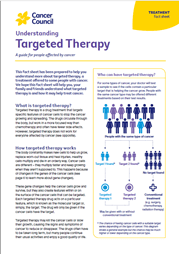- Home
- Cancer Information
- Cancer treatment
- Targeted therapy
- Types of targeted therapy
Types of targeted therapy
There are many different types of targeted therapy drugs. They are put into groups based on how they work. The two main groups of targeted therapy drugs are monoclonal antibodies and small molecule inhibitors. New drugs become available every year, so talk to your cancer specialist for the latest information.
Learn more about:
Monoclonal antibodies
The body’s immune system makes proteins called antibodies to help fight infections. Monoclonal antibodies are manufactured (synthetic) versions of these natural antibodies. They lock onto a protein on the surface of cells or surrounding tissues to affect how cancer cells grow and survive.
Monoclonal antibodies can be classified as targeted therapy or immunotherapy, depending on the type of monoclonal antibody.
Types of targeted therapy monoclonal antibodies include:
Type |
How they work |
Examples |
| angiogenesis inhibitors |
These drugs reduce the blood supply to a tumour to slow or stop it growing. They target various proteins linked with the growth of new blood vessels and stop them from working. |
|
| HER2-targeted agents |
High levels of the protein HER2 cause cancer cells to grow uncontrollably. Some targeted therapy drugs destroy the HER2 positive cancer cells, or reduce their ability to divide and grow. |
|
| anti-CD20 monoclonal antibodies |
These drugs target a protein called CD20 found on some B-cell leukaemia and non-Hodgkin lymphomas. |
|
Small molecule inhibitors
These drugs are small enough to get inside cancer cells and block certain proteins that tell cancer cells to grow.
Types of small molecule inhibitors include:
Type |
How they work |
Examples |
| TKIs | Tyrosine kinase inhibitors (TKIs) block proteins called tyrosine kinases from sending signals that tell cancer cells to grow, multiply and spread. Without this signal, the cancer cells may die. |
|
| mTOR inhibitors | These drugs block mammalian target of rapamycin (mTOR), a protein that tells cancer cells to grow and spread. |
|
| PARP inhibitors | These drugs block poly (ADP-ribose) polymerase (PARP), a protein that repairs damaged DNA in cancer cells. |
|
| CDK inhibitors | These drugs block cyclin-dependent kinase (CDK) from sending signals that tell cancer cells to grow, multiply and spread. Without this signal, the cancer cells may die. |
|
Podcast: Immunotherapy and Targeted Therapy
Listen now
More resources
This information was reviewed by: A/Prof Brett Hughes, Senior Staff Specialist, Medical Oncology, Royal Brisbane and Women’s Hospital and The Prince Charles Hospital, and The University of Queensland, QLD; Natalie Dubs, Consumer; Hazel Everett, Clinical Nurse Consultant, Cancer Services, St John of God Subiaco Hospital, WA; Karen Hall, 13 11 20 Consultant, Cancer Council SA; Dr Hilda High, Genetic Oncologist, Sydney Cancer Genetics, NSW; Ingrid Kivikoski, Consumer; Anne McGregor, Consumer; Donna Milne, Nurse Consultant, Melanoma and Skin Service, Peter MacCallum Cancer Centre, VIC; Prof Nick Pavlakis, Board Chair, Thoracic Oncology Group of Australasia (TOGA), and Senior Staff Specialist, Department of Medical Oncology, Royal North Shore Hospital, NSW; Gay Refeld, Clinical Nurse Consultant, Breast Care, St John of God Subiaco Hospital, WA.
View the Cancer Council NSW editorial policy.
View all publications or call 13 11 20 for free printed copies.
Need to talk?
Support services
Coping with cancer?
Ask a health professional or someone who’s been there, or find a support group or forum
Need legal and financial assistance?
Pro bono legal and financial matters, no interest loans or help with small business
Cancer information
Dealing with the diagnosis
Common reactions to a cancer diagnosis and how to find hope
View our publications
Guides and fact sheets for people with cancer, their families and friends

